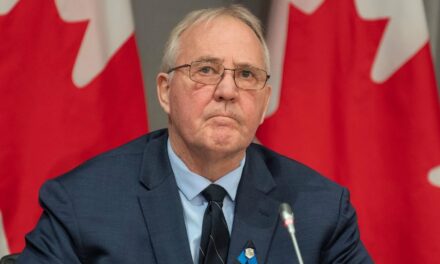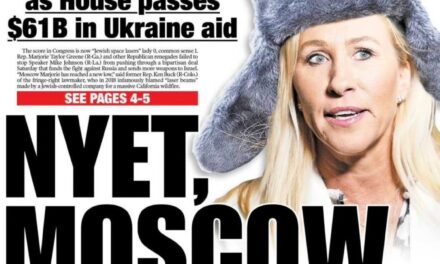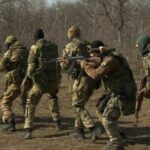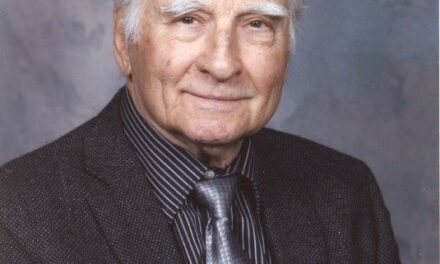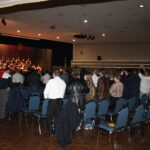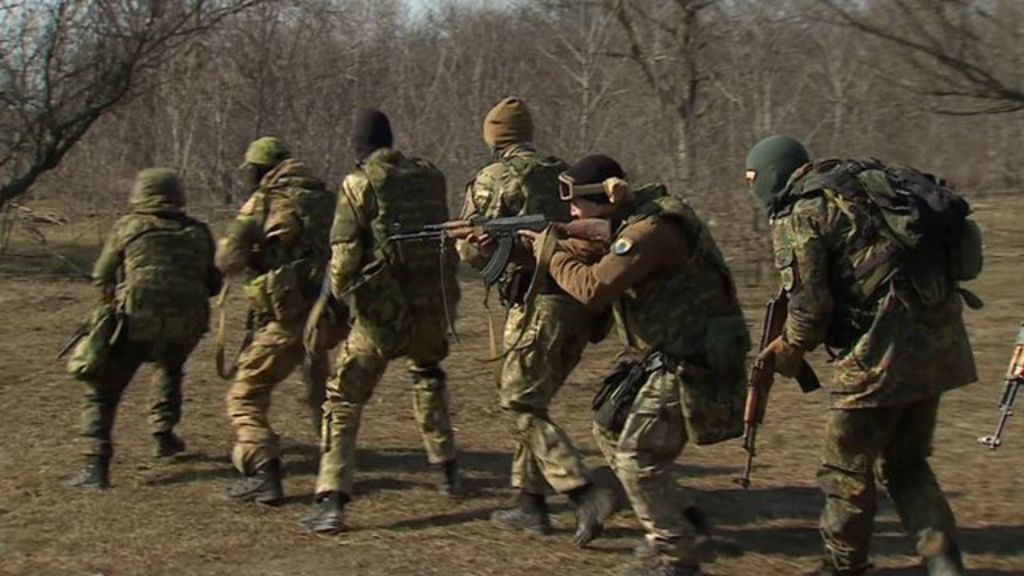Azov Battalion defend Mariupol. Photo credit BBC News
Marco Levytsky, Editorial Writer.
The most poignant moment of last month’s Oscar Awards ceremony came when Director Mstyslav Chernov accepted the award for best documentary for his frightening but factual account of the first three weeks of the horrific Russian siege of Mariupol in 2022.
“This is the first Oscar in Ukrainian history, and I’m honored,” Chernov said as he accepted the award. “Probably I will be the first director on this stage to say I wish I’d never made this film, I wish to be able to exchange this for Russia never attacking Ukraine.”
Chernov and his colleagues, photographer Evgeniy Maloletka and field producer Vasilisa Stepanenko, were the last international reporters to remain in Mariupol as Russian troops attacked the city. They documented what would become defining images of the war: dying children, mass graves, the bombing of a maternity hospital, and more.
The siege lasted from February 24 to May 20. During the Russian siege, the Red Cross described the situation in Mariupol as “apocalyptic.” Indeed, Ukrainian authorities accused Russia of engineering a major humanitarian crisis in the city.
The defenders – members of the much-maligned Azov Battalion — held out for as long as they could until they had no ammunition and no hope of relief and were ordered to surrender.
As prisoners of war in the notorious Olenivka prison, they were subjected to unspeakable tortures in brazen violation of the Geneva Conventions.
“Male prisoners were regularly removed from their cells, beaten, then locked up again. We heard their cries,” Anna Vorosheva – a 45-year-old Ukrainian entrepreneur who spent 100 days in Olenivka after being detained in mid-March at a checkpoint run by the pro-Russian Donetsk People’s Republic (DNR) in eastern Ukraine – told the British newspaper The Observer.
“They played loud music to cover the screams. Torture happened all the time. Sharing an ‘inside joke,’ after inmates were released, friendly investigators would jokingly ask them, ‘What happened to your face?’ The soldier would reply, ‘I fell over,’ while laughing together at the shared deceptive understatement.
“It was a demonstration of power. The prisoners understood that anything could happen to them, that they might easily be killed. A small number of the Azov guys were captured before the mass surrender in May,” she added.
Over 50 of them were burned to death in a mysterious and devastating explosion on July 29, 2022 that Moscow attempted to blame on Ukraine, but satellite images and independent analysis suggested a powerful bomb obliterated them when it was detonated inside the building.
The Russians illegally refused to recognize members of the Azov Battalion as Prisoners of War, instead labelling them as “terrorists.”
“It seems clear that the charges being brought are just a pretext to prosecute Ukrainian soldiers for defending Mariupol from the Russian assault,” commented Kseniya Kvitka, Assistant Researcher for Human Rights Watch at the time. “Prosecuting prisoners of war for participation in the conflict, depriving them of their fair trial rights, and subjecting them to torture or inhuman treatment are all breaches of the Geneva Conventions and war crimes.”
Designating the Azov Battalion as “terrorists” or “Nazis” is all part and parcel of Russian propaganda’s broader campaign to vilify the entire Ukrainian nation, including its Jewish President, as “Nazis”. But far-right parties in Ukraine have minimal electoral support, especially when compared with other countries. In the first round of the 2019 Ukrainian presidential election Svoboda candidate Ruslan Koshulynskyi received a meager 1.62 of the vote, while in the parliamentary elections that same year, Svoboda only got 2.16% which is not even halfway to the 5% threshold needed to enter parliament. Yet far-right parties control the governments of Hungary and Israel, pose a major threat in France and the Netherlands, have managed to block aid to Ukraine for months in the U.S. Congress and pose a very real threat of taking over the U.S. presidency. The attention of media and academics to far-right parties in Ukraine has been grossly disproportionate to their actual support, especially considering their benign indifference to other far-right political groups elsewhere in the world.
When it comes to the presence of antisemitism in Eastern Europe, there is very little of it in Ukraine. Aside from electing a Jewish president with 73% vote support, a 2018 survey by the Pew Research Center found Ukrainians to be the most supportive of Jews of 18 East European countries whose residents were asked whether they would NOT accept Jews as fellow citizens. Elsewhere in Eastern Europe, roughly 20 percent said they were not supportive of Jewish people, but in Ukraine the number only amounted to 5%.
Allegations of antisemitism against the Azov Battalion are also unfounded. From the start of the Azov unit’s existence, ethnic Jews have served in its ranks. One of the most well-known Azov fighters of Jewish origin is Ruslan Serbov, with the call sign “David”, a direct reference to the figure of the biblical King of Judea and Israel. “David” visited Israel in November 2022 for rehabilitation after the amputation of his leg as a result of injuries sustained in the battles for Mariupol, according to the website war.ukraine.ua, which is administered by the NGO Brand Ukraine in cooperation with the Ukrainian Ministry of Foreign Affairs.
While the early formation of the Azov Battalion did contain far-right elements, in mid November of 2014 it was formally incorporated into the National Guard of Ukraine and remains to this day under the jurisdiction of the Ukrainian Ministry of Defence. It is one of Ukraine’s most effective forces battling Russian aggression. In the entire history of Azov’s existence, there is not a single proven instance of disobedience or sabotage of orders by Azov troops of the Ukrainian General Staff, also according to NGO Brand Ukraine.
Unfortunately, the tentacles of insidious Russian propaganda reach far and wide and have even managed to infiltrate some Canadian bureaucratic levels. Since Canada has never recognized the Azov Battalion as a terrorist organization, any attempt to do so through the backdoor will serve only to reward and further encourage Russian propaganda and unjustifiably ruin the lives of many individuals whose only “crime” was to stand up and defend the freedom of their fellow citizens.
Share on Social Media







